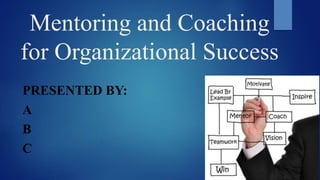
Mentoring and coaching for organizational success
- 1. Mentoring and Coaching for Organizational Success PRESENTED BY: A B C
- 2. Difference between Mentoring and Coaching Mentoring Coaching business mentor provides: 1. support to the mentees with regard to their career growth and interpersonal skill development. Mentor helps mentees to : 1. Explore career options 2. set development goals 3. develop new contacts 4. identify resources. Mentoring is a long-term process based on mutual trust and respect. A business coach focuses on: 1. specific skills and development goals by breaking them into concrete tasks to be completed within a specified period of time. Business coaches help and guide businesses clarify their growth vision. Coaching is for a short period of time
- 3. Advantages of Mentoring and Coaching for Employees Learn and Grow within the Company Inexperienced employees learns form Experienced employees in supported environment. Further enhancement of their skill level, problem analysis and strategic thinking Increased job satisfaction Promotes their professional and personal growth Boosts individual appreciation and self-confidence
- 4. Advantages for Employees Continued…. Helps in developing a healthy relationship with the management and supervisor. Helps to lessen the sense of low self-esteem and disappointment. Provides perspective to think about a better work role and career. Recognizes weaker sections and converts them into potential successes
- 5. Advantages of Mentoring and Coaching for Organizational success More skilled and well-performing employees. Greater employee retention. Human resources are utilized to its fullest. Greater possibilities of attaining goals and success. The succession plan is planned and drawn in advance. Developed skill set and expertise of the employees. Communication within the workplace and organization as a whole is improved. Company culture and ethics gets strengthened.
- 6. How Coaching and Mentoring sessions work Collaborative environment in the workplace wherein professional training is productive Employees are willing and committed to expand, improve and develop themselves. The management recognizes the requirements of the employees for professional learning that must be attained to raise organizational standards . There are standard methods and sets of styles for mentoring and coaching programs. To incorporate coaching and to mentor, the work roles of employees are redefined. The appointed mentors have the critical personal and professional characteristics and experiences needed for effective coaching. These experts also provide constant coaching and improvement required for the development of the employees. There is an all-round assessment of the effect of coaching/mentoring on individuals and the organization.
- 7. Mentoring and Coaching Tips Devise clear goals that include benchmarks and deadlines Be prepared to help with time management Frame feedback in a straightforward and positive manner Follow up on feedback Emphasize effort over ability Celebrate accomplishments Listen more; speak less
- 8. Reverse mentoring: initiative in which older executives are paired with and mentored by younger employees on topics such as technology, social media and current trends. E-mentoring Keep in touch with their mentors via e-mail, Facebook, and Twitter, but they may get together for lunch if they happen to be in the same location.
- 9. Barriers to effective mentoring and coaching 1. Poor matching of mentors or coaches to their mentees 2. Anger from those not chosen to participate in mentoring and coaching programed, perhaps due to a perception of favoritism 3. The creation of unrealistic expectations as to what mentoring and coaching can achieve
- 10. Cost of Mentoring and Coaching Cost of time and energy Loss if mentor Fails or employee fails to fulfill the training requirements. If this process is outsourced then organization have to bear high cost
- 11. Conclusion Coaching and mentoring can provide an array of benefits for organizations of all sizes when conducted in an efficient and effective manner. Coaching and mentoring provides employees a way to connect, Learn and grow within the company and along their own career path.
- 12. THANK YOU